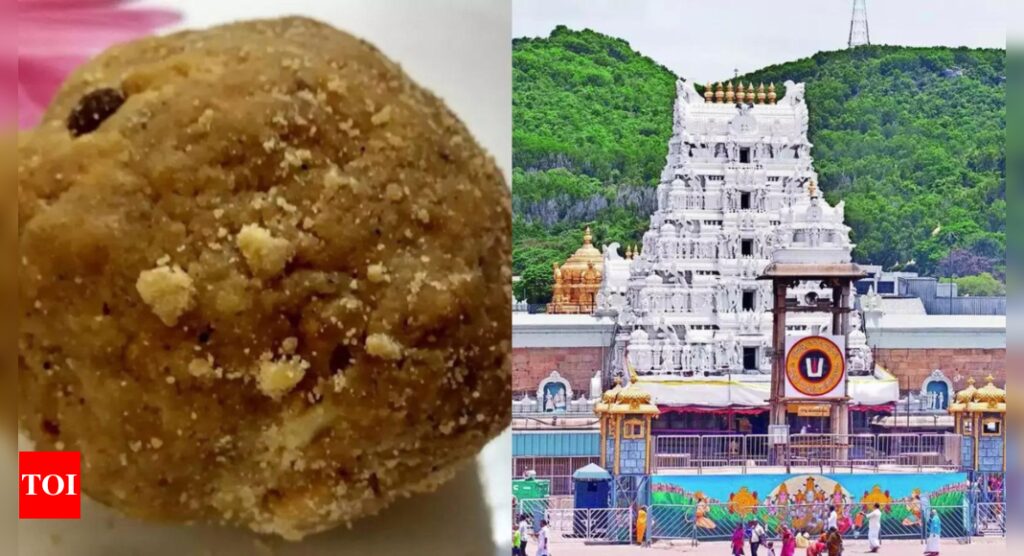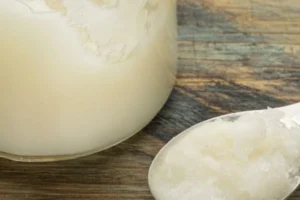
TIRUPATI: The TDP govt in Andhra Pradesh on Thursday made public laboratory analysis of the cow ghee samples supplied to the Tirumala temple trust for making its famous Tirupati laddu prasadam during the term of the YSRC govt. It revealed the presence of foreign fats including lard (clarified pig fat), tallow (beef fat) and fish oil.
The samples also contained fats from vegetable sources like coconut, linseed, rapeseed and cottonseed.The analysis was conducted on July 23 after the government received complaints of change in taste of the laddu prasadam.
Chief minister N Chandrababu Naidu had sparked a major controversy on Wednesday when he told NDA allies that animal fat had been found in the ghee for the laddus when YSRC was in power. YSRC had reacted angrily, denying the allegations and claiming it to be one of Naidu’s political stunts.
The analysis by the Centre for Analysis and Learning in Livestock and Food (CALF) of the National Dairy Development Board (NDDB), however comes with a caveat – there can be chances of false positive results in certain circumstances. The report lists several conditions where a result could go wrong, including in cases like overfeeding cows with feed rich in vegetable oils, underfeeding cows or the milk being subjected to technological treatments like removal of cholesterol.
The report is silent whether the adulterants were deliberately added or crept in through feeding conditions and other factors.
Naidu’s allegation and the NDDB’s report have shocked millions of devotees of Lord Venkateswara across the globe as the Tirupati laddus are considered Maha Prasadam and carry a high sentimental value.
The TDP govt had in June appointed senior IAS officer J Syamala Rao as the new executive officer of the Tirumala Tirupati Devasthanams (TTD) which manages the temple complex. As part of streamlining measures, an inquiry was ordered into the alleged poor quality, taste and texture of the laddus.
TTD constituted an expert committee to look into the quality of the prasadam. The members included Dr B Surendranth, former principal scientist of the National Dairy Research Institute, Vijayawada, Bhaskar Reddy (dairy expert), Prof B Mahadevan (IIM-Bangalore) and Dr G Swarnalatha from the Telangana Veterinary University
Apart from suggesting several measures to TTD to restore the taste and quality, the committee also sent samples of the ghee to NDDB, Gujarat. The lab reports, issued in July, confirmed the presence of foreign fats. TTD returned the ghee stocks supplied by AR Dairy Foods, Dindigul, in Tamil Nadu and blacklisted the contractor. Then, TTD selected Karnataka Milk Federation to supply the ghee.
TTD sources said that while cow ghee was procured from the blacklisted contractor at Rs 320 per kg, the Tirupati trust is now procuring ghee at Rs 475 per kg from the Karnataka federation.
TTD prepares and distributes about 3 lakh laddus to the devotees every day at Tirumala. Every year, the trust earns around Rs 500 crore from laddu sales alone.
The samples also contained fats from vegetable sources like coconut, linseed, rapeseed and cottonseed.The analysis was conducted on July 23 after the government received complaints of change in taste of the laddu prasadam.
Chief minister N Chandrababu Naidu had sparked a major controversy on Wednesday when he told NDA allies that animal fat had been found in the ghee for the laddus when YSRC was in power. YSRC had reacted angrily, denying the allegations and claiming it to be one of Naidu’s political stunts.
The analysis by the Centre for Analysis and Learning in Livestock and Food (CALF) of the National Dairy Development Board (NDDB), however comes with a caveat – there can be chances of false positive results in certain circumstances. The report lists several conditions where a result could go wrong, including in cases like overfeeding cows with feed rich in vegetable oils, underfeeding cows or the milk being subjected to technological treatments like removal of cholesterol.
The report is silent whether the adulterants were deliberately added or crept in through feeding conditions and other factors.
Naidu’s allegation and the NDDB’s report have shocked millions of devotees of Lord Venkateswara across the globe as the Tirupati laddus are considered Maha Prasadam and carry a high sentimental value.
The TDP govt had in June appointed senior IAS officer J Syamala Rao as the new executive officer of the Tirumala Tirupati Devasthanams (TTD) which manages the temple complex. As part of streamlining measures, an inquiry was ordered into the alleged poor quality, taste and texture of the laddus.
TTD constituted an expert committee to look into the quality of the prasadam. The members included Dr B Surendranth, former principal scientist of the National Dairy Research Institute, Vijayawada, Bhaskar Reddy (dairy expert), Prof B Mahadevan (IIM-Bangalore) and Dr G Swarnalatha from the Telangana Veterinary University
Apart from suggesting several measures to TTD to restore the taste and quality, the committee also sent samples of the ghee to NDDB, Gujarat. The lab reports, issued in July, confirmed the presence of foreign fats. TTD returned the ghee stocks supplied by AR Dairy Foods, Dindigul, in Tamil Nadu and blacklisted the contractor. Then, TTD selected Karnataka Milk Federation to supply the ghee.
TTD sources said that while cow ghee was procured from the blacklisted contractor at Rs 320 per kg, the Tirupati trust is now procuring ghee at Rs 475 per kg from the Karnataka federation.
TTD prepares and distributes about 3 lakh laddus to the devotees every day at Tirumala. Every year, the trust earns around Rs 500 crore from laddu sales alone.




